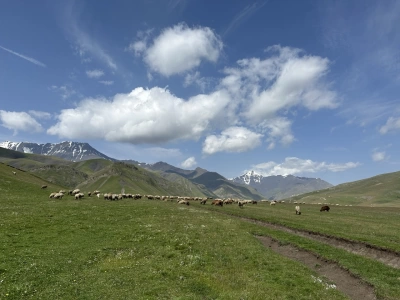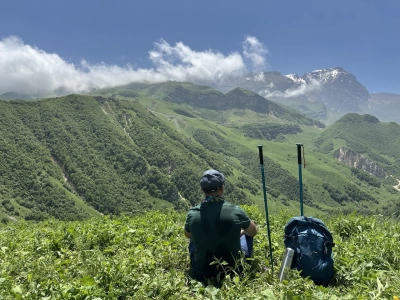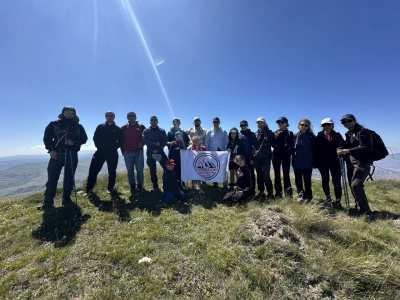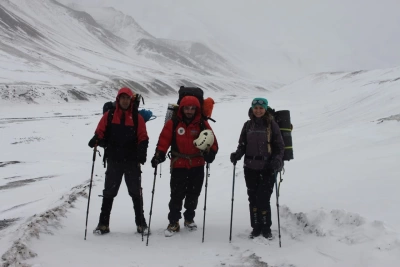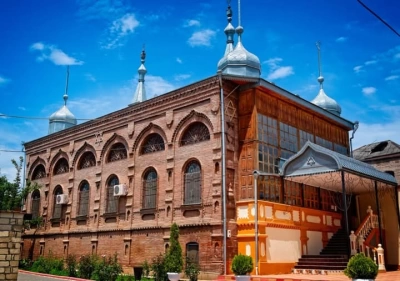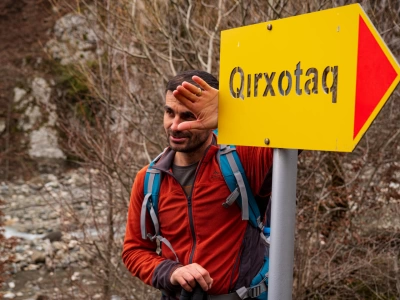The Transcaucasian Trail (TCT) offers a rare opportunity to discover the natural and cultural richness of Azerbaijan. Starting from the waters of the Samur River, this route winds through the towering peaks of the Caucasus Mountains, connecting the villages of Khinalig, Laza, Griz, and Yergikek. At every step, ancient history, unique culture, and breathtaking nature await.
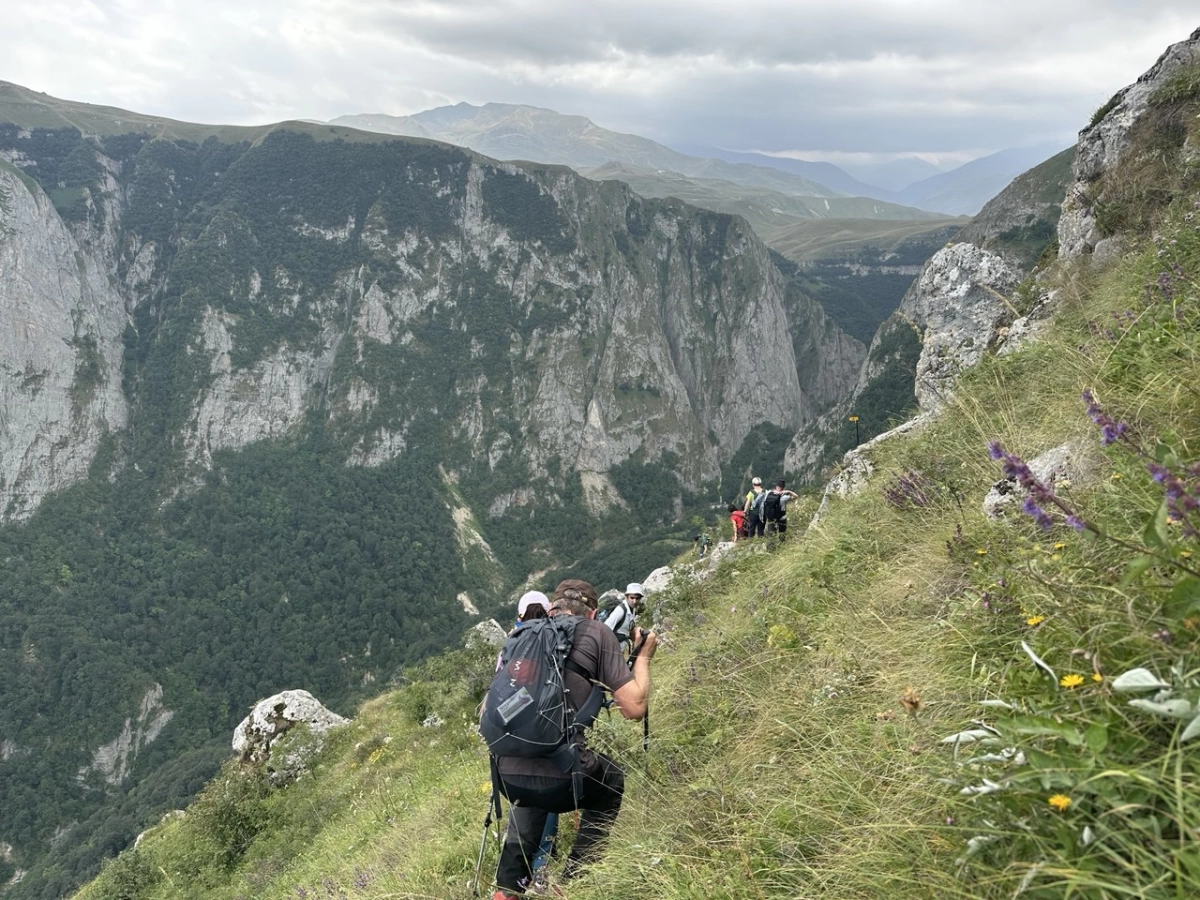
This region bears traces of ancient peoples; villages where different languages, traditions, and cuisines meet have long fascinated travelers. During summer, the voices of shepherds and the bells of sheep echo through the mountains, while lush green pastures cover the highlands.
The trail begins in Khinalig, one of the highest mountain villages in Azerbaijan nestled in the heart of the Caucasus. Here, you can stay in different local homes each night, experiencing the daily life, culture, and ancient customs of the villagers. As you hike from Khinalig along the mountain paths, you’ll encounter some of the purest and most untouched beauty in nature.
During the trek, we will cross the Gudyal River — the largest canyon in Azerbaijan — and reach Griz, a mountain village perched on rocky cliffs. Here you can observe the lives of the villagers who preserve their traditional way of life. Continuing through the clean and rapid mountain streams of the Caucasus, we’ll arrive at Laza village, where we will witness the famous Laza Waterfalls and the magnificent sights and sounds of nature.
In the final stage of the route, we will head towards the villages of Yergikek and Kukur, located at the foot of Mount Shahdag. Here, at the confluence of the Samur River waters, we will end our journey. The route offers both homestay options and the possibility to camp under the stars — a chance to fully immerse yourself in mountain air and the harmony of nature.
The Transcaucasian Trail promises an unforgettable experience for nature lovers, adventurers, and those seeking to explore the ancient culture of Azerbaijan. Each step reveals stunning landscapes, refreshing mountain rivers, waterfalls, and the warm hospitality of traditional mountain villages.
If you’re ready, lace up your boots and set off into the unique world of Azerbaijan’s Caucasus Mountains — the Transcaucasian Trail is waiting for you!
General Route Features
Distance: Approximately 55 km
Maximum Elevation: 2700 m
Starting Elevation: Khinalig village (2170 m)
Ending Elevation: 1585 m
Difficulty Level: Moderate–Challenging
Duration: 5 nights / 6 days
Things to Know Before the Hike
The Transcaucasian Trail (TCT) connects Azerbaijan’s mountain villages and stunning natural landscapes. However, since it passes through high mountain terrain, several important points should be considered during your journey:
Weather and Clothing: Weather in the mountains can change rapidly. A sunny morning can turn into sudden rain, fog, or chilly wind. Hikers should be equipped with waterproof, insulating clothing, sturdy hiking boots, and extra layers.
Local Guide: Some sections of the trail can be confusing or difficult. An experienced local guide ensures safety and provides insights into the villages and their culture.
River and Canyon Crossings: The Gudyal River and other mountain streams are key parts of the trail. Water depth and current can vary, so always follow your guide’s instructions and maintain a stable footing.
Camping Safety: If you plan to camp, choose a flat and stable area to set up your tent. Be aware of mountain winds and nighttime temperature drops. Respect nature and leave no waste behind.
Essential Equipment: Every hiker should carry a first aid kit, flashlight, enough water, and energy-rich snacks. Mobile connection might be weak in the mountains — always stay in contact with your guide in case of emergencies.
Physical Preparation and Teamwork: Some parts of the route involve steep and challenging slopes. Good fitness, a steady pace, and group cooperation are essential for safety.
Best Hiking Season: The ideal months for TCT are May–November. Late spring and early autumn offer cool, comfortable weather and beautiful scenery. Hot summer days or snow-covered winter trails can make hiking difficult.
Food, Water, and Accommodation
Water and Drinks:
-
Mountain streams and springs are available along the route, but always carry enough drinking water with you.
-
Light bottles or a thermos are useful for carrying water easily during the hike.
Food:
-
You can taste local homemade meals in the village houses along the trail: mountain cheese, fresh dairy, homemade bread, honey, and fruits.
-
It’s good to carry energy snacks (dried fruits, nuts, energy bars), especially for long hiking days.
-
Meals offered by locals are both delicious and a great way to experience authentic culture.
Accommodation:
-
You can stay in village guesthouses along the route; simple rooms with beds are provided in most places.
-
For those who prefer camping, there are safe and flat areas at the mountain foothills. Keep in mind mountain winds and cold nights.
-
Respect the environment: collect your waste and only light fires in safe designated areas.
Hiking Tips
-
Check your physical condition and wear comfortable shoes.
-
Always carry water and energy snacks.
-
Hiking with local guides is both safer and more informative.
-
Be prepared for weather changes — rain and fog can appear suddenly in the mountains.
-
Respect nature — leave no trace.
Environment and Behavior Guidelines
-
Follow “leave no trace” principles — do not litter or damage nature.
-
Respect animals, plants, and local residents.
Keep noise levels low and act responsibly within the mountain and forest ecosystem.
Essential Gear
Shoes: Waterproof, comfortable hiking boots suitable for high-mountain terrain
Backpack: 20–35 L capacity
Clothing: Layered clothing suitable for warm and cold weather
Other Equipment: Thermos, water bottles, flashlight, stove head, wipes, personal hygiene items
For Camping: Tent, sleeping bag, gas cylinder, stove head, and other camping essentials.

